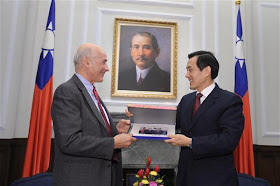 Still sounding like he’s running in the 2008 presidential election, Ma Ying-jeou stole an overused term by a prominent US academic and used it to show how much nicer his policies are than those of his predecessor
Still sounding like he’s running in the 2008 presidential election, Ma Ying-jeou stole an overused term by a prominent US academic and used it to show how much nicer his policies are than those of his predecessorAfter years of assailing our ears with notions of “win-win” situations President Ma Ying-jeou (馬英九) has now latched onto a new term that, unfortunately for us, he now seems intent on milking dry: “soft power.”
No sooner had US political scientist Joseph Nye (see above with Ma), the person who coined the overused and oft misused term, left after a quick visit earlier this month than Ma was borrowing it to describe his policies over the past two-and-a-half years. All of a sudden, Ma’s body of work appeared to blossom into a monument to so-called soft power, which, if we looked closely enough, was a euphemism for everything the administration of his predecessor, former president Chen Shui-bian (陳水扁), supposedly was not.
It was soft power, Ma claimed, that recently led the EU and Canadian governments to grant Republic of China (ROC) passport holders visa-waiver treatment. Never mind that governments decide whether to grant exemptions on the basis of such practical considerations as the security of travel documents. In this case, those requirements included the introduction of biometric passports in 2008 — first issued after Ma came into office, granted, but the result of policies implemented under the Chen administration.
In other words, visa exemptions were granted because manifold requirements were met, not because of soft power à la Ma.
My unsigned editorial, published today in the Taipei Times, continues here.

No comments:
Post a Comment
Note: Only a member of this blog may post a comment.